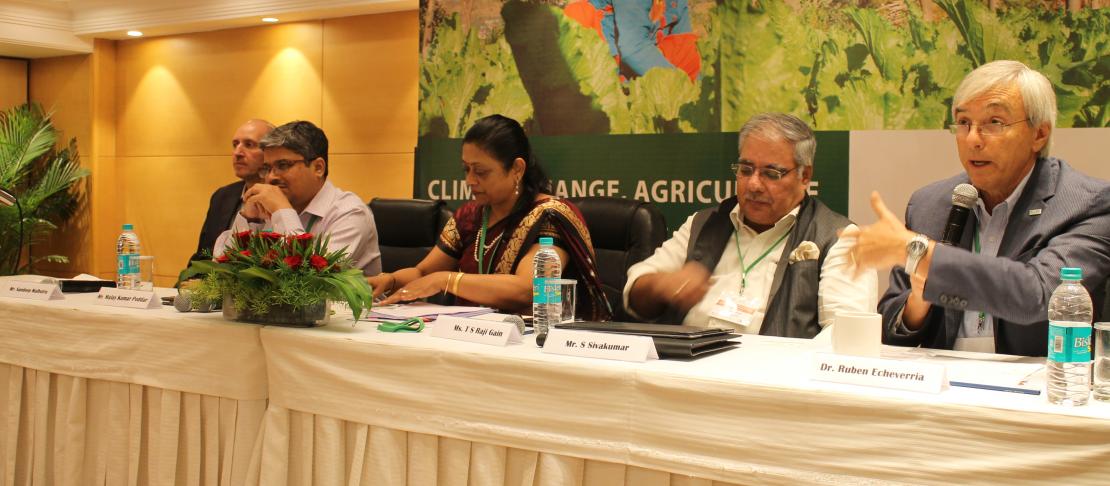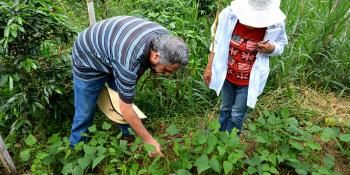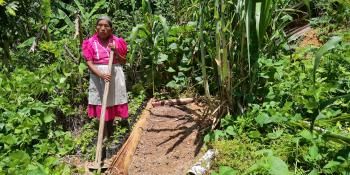Bolstering the journey to a climate resilient future in South Asian agriculture

Understanding national perspectives on priorities for research in South Asia
Over the past few years, the South Asian region has taken rapid strides towards adaptation and mitigation measures to counter the challenges posed by climate change over its agricultural system. The coming together of farmers, scientific community, policymakers as well as civil society has led to the emergence of innovative solutions in the field. The CGIAR Research Program on Climate Change, Agriculture and Food Security's (CCAFS) Climate-Smart Village (CSV) approach of promoting climate-smart agricultural (CSA) practices is a fitting illustration of the aforesaid point. Yet, South Asia continues to harbour almost 1/4 of the world’s hungry and remains a victim of climatic stresses upon its farming system, threatening its food security.
To understand the national perspectives and discuss the way forward for research in the region, a consultation between national partners and the CGIAR-CCAFS management committee was organized by CCAFS South Asia in New Delhi on 11 September. The participants included researchers, policymakers, agro-industry representatives from South Asia, as well as leading international experts working on CCAFS focus areas. The consultation began with a discussion on national perspectives led by Prof Ramesh Chand (member-agriculture, Niti Aayog; India’s primary planning body), Dr Bimala Rai (advisor to the President of Nepal), Dr T. Mohapatra (Director General, Indian Council of Agricultural Research) and Dr H. Pathak (Professor and Principal Scientist, Indian Agriculture Research Institute). This was followed by a panel discussion on how CGIAR-CCAFS and National Agricultural Research Systems should link with the private sector for accelerating climate risk management in agriculture.
Gathering the national perspectives
A comprehensive outlook on the historical progression of agriculture in India up to the current challenges was provided by Prof Chand. He highlighted the problems of degraded eco-systems, depleted water tables, soil-nutrient loss etc., being faced by agriculture system in the region which is further compounded by climate change, having an adverse impact on farmers’ incomes as well as health. In the face of such crises, he advocated the need for alternative ways of doing farming, especially conservation agriculture and increasing shift to organic farming. Dr H. Pathak pointed towards the climatic anomalies quite visible in India, with special reference to the current year, where despite 'normal monsoons’ farmers faced either flood related losses in some areas and water deficit in some other. This calls for consistent, technology driven solutions.
Taking the narrative of national perspectives further, Dr T. Mohapatra underscored the accomplishments in Indian agriculture, especially the maintenance of sustainable levels of production despite various challenges. He acknowledged the key role played by a synergy between scientists, researchers, policymakers, farmers and the CGIAR centres in helping such positive outcomes. However, "while trying to keep pace with productivity, sustainability often becomes the casualty," he added. Thus, he emphasized upon a continued and close collaboration between national systems, the CGIAR as well as policymakers to devise strategies for making agriculture sustainable in the region and ensuring profitability for farmers.
With regards to Nepal, Dr Bimala Rai pointed out the missing link between different levels of policies and planners when talking about climate change risk adaptation and mitigation in agriculture. She insisted on concerted efforts to improve communication and coordination among different stakeholders to avoid duplication of efforts and maximize extension service through more informed research. She further said, "In Nepal nearly 80% of those involved in agriculture are women, yet only 10% have ownership of land," thereby, drawing attention to the imminent need for advancing gender inclusiveness in research and policy design.
Exploring links between research systems and the private sector for advancing climate resilience in South Asian agriculture
The panel discussion had representatives from agri-business, insurance, banking as well as the ICT sector. From the private sector business perspective, a lot more knowledge funding through research is required in order to make serviceable products for farmers. A multi-entrepreneurial model has been advocated for the creation of business services for climate-related issues in agriculture. On the other hand, banking and institutional facilities are looking forward to enhanced research in the socio-economic arena. An institutional mapping of the social scenario can better inform this sector regarding what works and does not work for the farmers while trying to build their resilience.
From the risk management perspective, the toughest challenge is to quickly and objectively satisfy the core customer i.e. the farmer. Researchers and the insurance sector have to closely collaborate with each other so that the latter is kept informed regarding the best ways for implementing the schemes. From the viewpoint of agro-advisory industry, the most effective linkage with the scientific community can be established while designing practical, action-based research methods. Abundant research without equivalent extension services will, in fact, be counter-productive.
To sum up the various points of view, CIAT Director General Ruben Echeverria’s statements can be looked at. He rightly pointed out that the buzz words right now need to be policy engagement, communication and partnerships. CCAFS research in the region in the second phase must be more demand-driven and impact-oriented to ensure that no wide gap remains between policy implementation and research outcomes. One of the most important partnerships can be established with the private sector, which is booming in countries like India. Such partnerships can ensure that innovative business models in the agriculture sector emerge, largely managed by youth entrepreneurs, making the sector profitable for not just themselves but also for the farmers while devising ingenious strategies to create resilience and environmental sustainability.
Read more:
- Progressing towards climate resilient agriculture; top ten success stories from CCAFS in South Asia
- Special edition CCAFS South Asia newsletter on Gender and Social Inclusion
Shehnab Sahin is the Communications Specialist at CCAFS South Asia.


